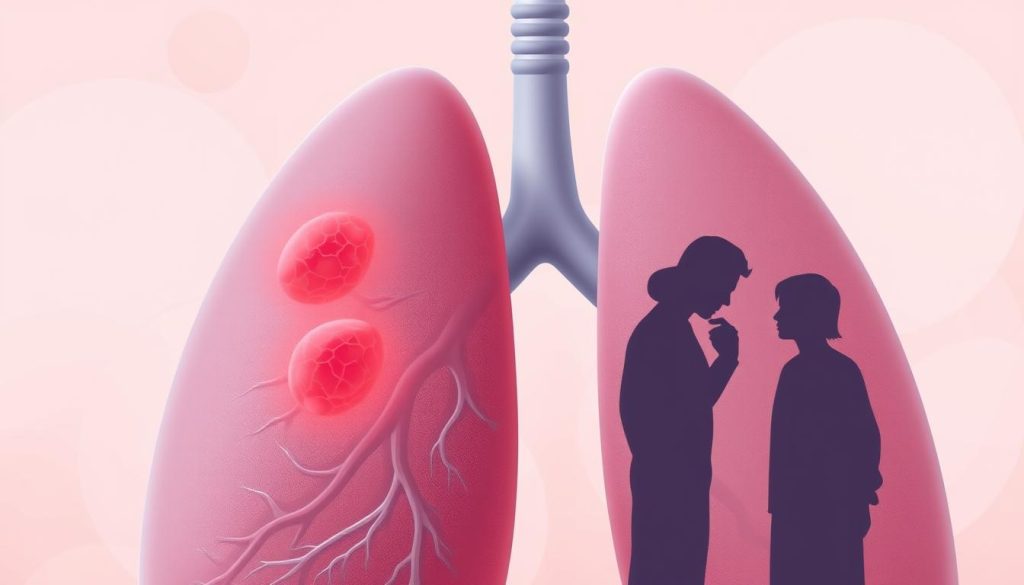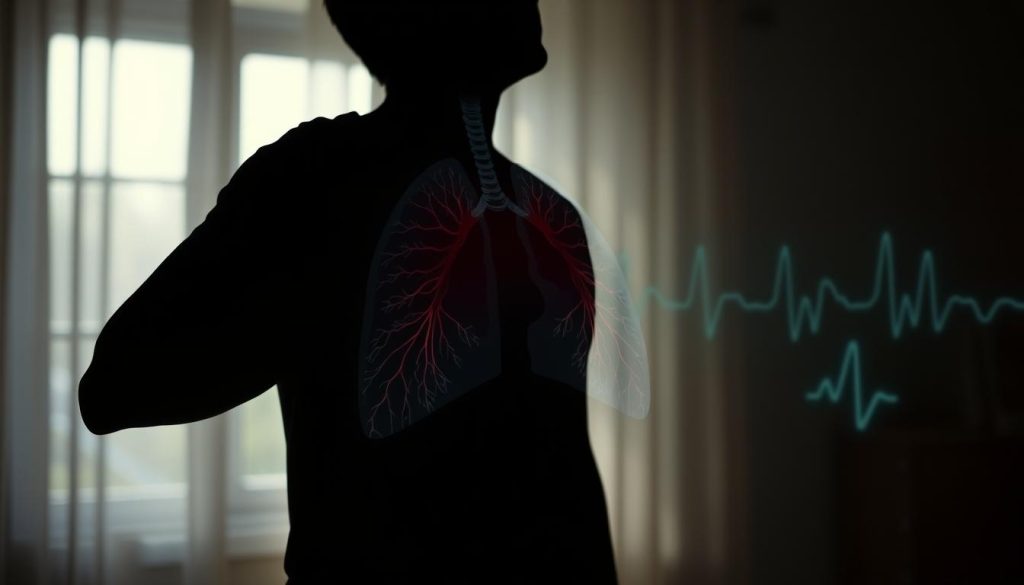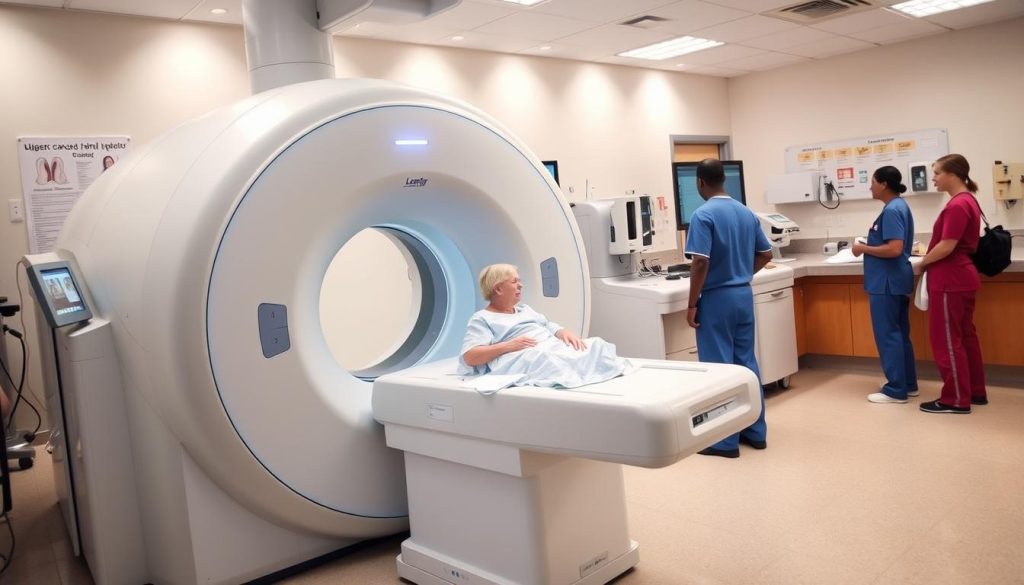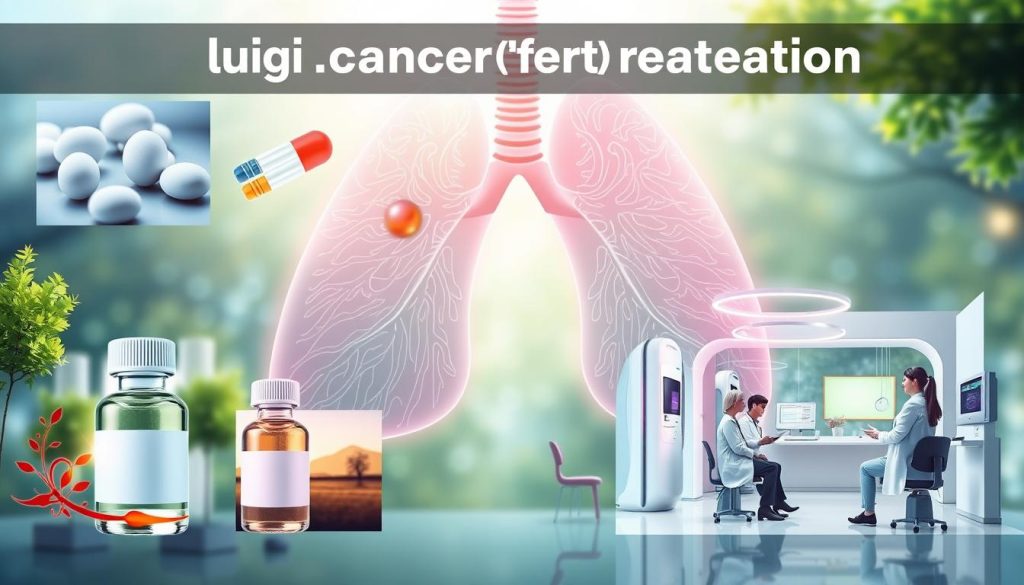Lung cancer is a big health problem, affecting millions around the world. Knowing the early signs can greatly improve treatment chances. This guide will help you understand lung cancer symptoms and early signs, so you can protect your health.
Finding lung cancer early is hard because symptoms can seem like common colds or flu. But, it’s important to notice these small changes in your body. We’ll look at key signs like persistent coughs and unexplained weight loss.
Learning about these signs is a big step in keeping your lungs healthy. Early detection can lead to better treatment and a better outcome. Let’s explore the important info you need to know about lung cancer symptoms and when to see a doctor.
Understanding Lung Cancer: A Comprehensive Overview
Lung cancer is a serious disease that affects millions globally. It starts when lung cells grow out of control, forming tumors that block breathing. Knowing how it develops and its types is key for diagnosing and treating it effectively.
What Is Lung Cancer and How Does It Develop
Lung cancer begins in lung cells, often from smoking or other harmful substances. These substances damage DNA, leading to abnormal cell growth. As it grows, it can spread to other parts of the body, known as metastasis.
Types of Lung Cancer and Their Characteristics
There are two main types of lung cancer: non-small cell lung cancer (NSCLC) and small cell lung cancer (SCLC). NSCLC makes up about 80-85% of cases. It includes subtypes like adenocarcinoma and squamous cell carcinoma. SCLC is less common but spreads quickly to other organs.
Impact on Global Health Statistics
Lung cancer is a top cause of cancer deaths worldwide. In the U.S., over 200,000 new cases are diagnosed yearly. Early detection and understanding lung cancer stages can improve survival rates. New treatments offer hope for better outcomes and quality of life for those with lung cancer.
Signs of Lung Cancer: Common Warning Signals
Spotting lung cancer early can greatly improve treatment chances. Symptoms often creep up slowly, making them hard to notice. Here are the common signs that might point to lung cancer.
Respiratory Symptoms and Changes
Respiratory problems are often the first hint of lung cancer. These include:
- Persistent cough that won’t go away
- Coughing up blood or rust-colored sputum
- Wheezing or shortness of breath
- Hoarseness or changes in voice
Physical Manifestations
Lung cancer can also show up in visible body changes. Look out for:
- Swelling in the face or neck
- Unexplained weight loss
- Clubbing of fingertips

Systemic Symptoms
Some symptoms of lung cancer affect the whole body. These include:
- Fatigue or weakness
- Recurring infections like bronchitis or pneumonia
- Unexplained fever or night sweats
| Symptom Category | Examples | Prevalence |
|---|---|---|
| Respiratory | Persistent cough, Shortness of breath | 75% |
| Physical | Weight loss, Face swelling | 50% |
| Systemic | Fatigue, Recurring infections | 60% |
Seeing these signs doesn’t mean you definitely have lung cancer. Many other conditions can cause similar symptoms. If you notice any lasting changes, see your doctor for a check-up and diagnosis.
Persistent Cough and Changes in Breathing Patterns
A persistent cough is a common early sign of lung cancer. It may start off mild but can get worse over time. In severe cases, it can even cause coughing up blood.
Changes in breathing patterns are also important signs to watch for. You might notice:
- Shortness of breath
- Wheezing
- Chest tightness
- Difficulty taking deep breaths
These symptoms can develop slowly and might be mistaken for other issues like asthma or bronchitis. If you have breathing problems for weeks, it’s important to see a doctor for a check-up.
| Normal Cough | Potential Lung Cancer Cough |
|---|---|
| Lasts 1-3 weeks | Persists over 3-4 weeks |
| Improves with over-the-counter medicine | Doesn’t respond to typical treatments |
| No blood in mucus | May contain blood |
| No significant impact on daily activities | Interferes with sleep and daily life |
Early detection is critical. If you have ongoing respiratory symptoms, don’t delay in getting medical help. Your health is worth the extra care.
Chest Pain and Discomfort: When to Be Concerned
Chest pain and discomfort are key signs of lung cancer. Not all chest pain means cancer, but some types and patterns are worrying.

Different Types of Chest Pain
Lung cancer symptoms can show up as different kinds of chest pain:
- Sharp, stabbing pain
- Dull, aching discomfort
- Burning sensation
- Tightness or pressure in the chest
Associated Symptoms
When chest pain comes with other lung cancer signs, get medical help fast. Look out for:
- Persistent cough
- Shortness of breath
- Coughing up blood
- Unexplained weight loss
Pain Patterns and Duration
The type of chest pain can hint at its cause. Lung cancer pain often:
- Gets worse with deep breathing or coughing
- Lasts for weeks or months
- Grows more intense over time
- May spread to the shoulder, back, or arm
If chest pain doesn’t go away or gets worse, seek a doctor’s help. Early diagnosis is key to better treatment.
Unexplained Weight Loss and Fatigue
Weight loss and fatigue are often overlooked lung cancer early warning signs. These subtle changes can signal the presence of this serious disease. If you experience sudden weight loss without trying or feel constantly tired, it’s important to pay attention.
Lung cancer symptoms can manifest in various ways. Unexplained weight loss is a common sign, often seen with loss of appetite. Cancer cells consume a lot of energy, leading to rapid weight decrease even with normal eating habits.
Extreme fatigue is another red flag. This isn’t just feeling tired after a long day. It’s a persistent, overwhelming exhaustion that doesn’t improve with rest. This fatigue can significantly impact daily life, making simple tasks feel challenging.
- Sudden weight loss without diet changes
- Constant tiredness not relieved by sleep
- Loss of appetite or feeling full quickly
- Weakness in daily activities
If you notice these symptoms, don’t ignore them. While they could be caused by other conditions, it’s essential to consult a doctor for proper evaluation. Early detection of lung cancer symptoms can lead to more effective treatment options and improved outcomes.
Risk Factors and High-Risk Groups
Knowing about lung cancer risk factors is important for prevention. Some risks can’t be changed, but many can with lifestyle choices. Let’s look at the main factors that raise the chance of getting lung cancer.
Smoking and Tobacco Use
Smoking is the top cause of lung cancer. Cigarettes have over 7,000 chemicals, many of which cause cancer. Smokers are 15 to 30 times more likely to get lung cancer than non-smokers. Quitting smoking is the best way to prevent lung cancer.
Environmental Factors
Being around certain substances can greatly increase lung cancer risk. These include:
- Radon gas
- Asbestos
- Air pollution
- Secondhand smoke
Genetic Predisposition
Some people are at higher risk due to their genes. Having a family history of lung cancer, like first-degree relatives, means a higher risk. Genetic testing might be suggested for those with a strong family history.
| Risk Factor | Relative Risk | Prevention Tips |
|---|---|---|
| Smoking | 15-30 times higher | Quit smoking, avoid secondhand smoke |
| Radon Exposure | 5-25% increased risk | Test home for radon, improve ventilation |
| Family History | 2-3 times higher | Regular screenings, healthy lifestyle |
By knowing these lung cancer risk factors, people can take steps to lower their risk. Regular health checks and early screenings are key for those at high risk.
Diagnostic Tools and Screening Methods
Early detection is key to beating lung cancer. Doctors use many tools and methods to find lung cancer early. This helps catch the disease before symptoms show, boosting survival chances.
Lung cancer screening often begins with a low-dose CT scan. This test makes detailed lung pictures. It helps doctors spot small issues. For those at high risk, yearly scans can find lung cancer early, when it’s easier to treat.
If something looks off, more tests might be needed. These can include:
- Chest X-rays for a better lung view
- PET scans to see if cancer has spread
- Bronchoscopy to check the airways
- Needle biopsies to get tissue samples
Blood tests also help diagnose lung cancer. They look for biomarkers that might show cancer cells. While not sure on their own, they help guide more tests.
Regular check-ups are vital for early lung cancer detection. If you’re at high risk, talk to your doctor about starting screenings. Early detection with these tools can greatly improve outcomes for those with this tough disease.
Early Detection Through Regular Screening
Catching lung cancer early can greatly improve treatment outcomes. Regular screening is key to spotting the disease before symptoms show. Let’s look at the guidelines, options, and why early screening is important.
Screening Guidelines
The U.S. Preventive Services Task Force suggests yearly lung cancer screening for high-risk people. This includes adults aged 50-80 with a 20 pack-year smoking history. They must currently smoke or have quit in the last 15 years.
Available Testing Options
Low-dose computed tomography (LDCT) is the top choice for lung cancer screening. It’s a quick, painless scan that uses X-rays to show detailed lung images. This helps doctors find early signs of lung cancer.

Importance of Timely Screening
Screening early can greatly boost survival rates. When found early, lung cancer is more treatable. Patients then have more treatment options. Regular screening catches lung cancer early warning signs before symptoms appear.
| Stage at Diagnosis | 5-Year Survival Rate |
|---|---|
| Localized (Found early through screening) | 59% |
| Regional (Spread to nearby areas) | 32% |
| Distant (Spread to other parts of the body) | 6% |
Don’t wait for symptoms to show. If you’re at high risk, talk to your doctor about screening. Early detection can be a game-changer in fighting lung cancer.
Treatment Options and Medical Interventions
Understanding lung cancer treatment options is key. The right treatment depends on the cancer stage and your health.
Surgery is a main treatment for early-stage lung cancer. Doctors might remove part or all of the lung to get rid of cancer cells. If surgery isn’t possible, radiation therapy is an option. It uses high-energy beams to kill cancer cells.
Chemotherapy is a body-wide treatment that kills cancer cells. It’s often used with other treatments for better results. Targeted therapies, which focus on specific cancer mutations, are also being used. They are a new lung cancer treatment option.
The treatment plan changes with the cancer stage:
- Stage I: Surgery is often the main treatment
- Stage II and III: A mix of surgery, chemotherapy, and radiation
- Stage IV: Chemotherapy, targeted therapies, or immunotherapy
Immunotherapy is a new way to fight cancer. It helps your body’s defenses. It’s showing good results in advanced lung cancer. Your doctor will make a treatment plan just for you, based on your diagnosis and what you prefer.
Lifestyle Changes for Prevention
Preventing lung cancer is very important. Making smart choices can lower your risk and keep you healthy. Let’s look at some good tips and important risk factors.
Smoking Cessation Strategies
Quitting smoking is the biggest step in preventing lung cancer. Try nicotine patches, join groups, or get counseling. Pick a quit date and keep it. Quitting smoking can greatly improve your health, no matter when you start.
Environmental Protection Measures
Keep away from harmful substances in your environment. Check your home for radon gas. Wear protective gear if you handle dangerous materials. Stay away from secondhand smoke and polluted areas.
Healthy Living Practices
Living a healthy lifestyle helps fight lung cancer. Eat lots of fruits and veggies. Exercise to better your lung health. Get enough sleep and handle stress with relaxation.

| Lifestyle Change | Benefit | Implementation Tips |
|---|---|---|
| Quit Smoking | Reduces lung cancer risk by 50% after 10 years | Use nicotine patches, join support groups |
| Avoid Secondhand Smoke | Lowers risk by 20-30% | Create smoke-free zones, avoid smoky areas |
| Regular Exercise | Improves lung function and overall health | Aim for 150 minutes of moderate activity weekly |
| Healthy Diet | Boosts immune system and fights inflammation | Eat colorful fruits and vegetables daily |
By making these lifestyle changes, you can lower your lung cancer risk a lot. Remember, preventing lung cancer is very important.
Support Systems and Resources
Getting a lung cancer diagnosis can feel overwhelming. But, there are many support systems and resources to help. They offer emotional support, practical help, and important information.
Support groups are a safe place to share and learn. You can find them at hospitals, community centers, and online. They help you connect with others who understand your struggles.
Counseling services provide professional help for emotional challenges. Licensed therapists can teach coping skills and help with anxiety and depression. They aim to improve your mental health.
Patient advocacy groups offer a lot of help. They provide:
- Info on lung cancer treatments and clinical trials
- Financial help for medical and daily living costs
- Guidance from patient navigators through the healthcare system
- Helplines with healthcare experts to answer questions and offer support
These support systems and resources empower patients. They improve quality of life and may even increase survival rates. By using these services, you can face lung cancer challenges with more strength and support.
Latest Research and Medical Advances

The field of lung cancer research is moving fast, giving patients new hope. New treatments are changing how we care for lung cancer patients. This is leading to better survival rates.
Immunotherapy is a big leap forward in lung cancer treatment. It uses the body’s immune system to attack cancer cells. Early trials show it can lead to long-term remission for some patients.
Targeted therapies are also making a big difference. These drugs target specific genetic changes in cancer cells. This means treatments are more precise and have fewer side effects. Researchers have found new targets, opening up more treatment options.
Precision medicine is changing lung cancer care. Doctors use genetic analysis to tailor treatments to each patient. This approach has improved outcomes and quality of life for many.
- Combination therapies combining immunotherapy with chemotherapy or targeted drugs
- Liquid biopsies for early detection and treatment monitoring
- CAR T-cell therapy, showing promise in early trials
These advances are greatly improving lung cancer survival rates. While there are challenges, the outlook for lung cancer patients is getting better. Ongoing research is continually expanding what’s possible in lung cancer treatment.
When to Seek Medical Attention
It’s vital to spot lung cancer signs early. If you keep getting symptoms, see a doctor fast. Don’t overlook lung cancer signs. Early treatment can make a big difference.
Here are symptoms that need quick doctor visits:
- A cough that lasts longer than three weeks
- Coughing up blood or rust-colored sputum
- Shortness of breath or wheezing
- Chest pain that gets worse with deep breathing or coughing
- Unexplained weight loss and fatigue
- Recurring respiratory infections
These symptoms don’t always mean lung cancer. But, they shouldn’t be ignored. If you see any, and you’re at risk, see your doctor right away.
Spotting lung cancer early can lead to better treatments and survival chances. Don’t be scared to get medical help. Your health is important, so act if you notice any odd symptoms.
Living with Lung Cancer: Stories of Hope and Resilience
Many people with lung cancer are living inspiring lives. Thanks to early detection and new treatments, survival rates have gone up. These stories show the strength of resilience and modern medicine.
Take Bonnie Addario, for instance. She was diagnosed with stage 3B lung cancer in 2004. Yet, she not only survived but also started a foundation for lung cancer research. Her story proves how early detection can change lives.
Linnea Olson is another example of hope. She was diagnosed with stage 1B lung cancer in 2005. Later, she was diagnosed with stage 4. Despite this, Linnea’s story shows how new treatments and trials can extend life and improve quality of life. These tales remind us that a lung cancer diagnosis is just the start of a new chapter.
Lung cancer survival rates vary by stage, but these stories give hope. They highlight the need for early detection, new treatments, and the human spirit’s ability to overcome challenges.
FAQ
Q: What are the most common early signs of lung cancer?
A: Early signs of lung cancer include a cough that doesn’t go away or gets worse. You might also cough up blood or rust-colored sputum. Chest pain that gets worse with deep breathing or coughing is another sign. Hoarseness, unexplained weight loss, and feeling very tired are also symptoms.
It’s important to remember that these symptoms can have other causes too. But if you keep getting them, you should see a doctor right away.
Q: How does smoking affect lung cancer risk?
A: Smoking is the biggest risk for lung cancer, causing 80-90% of lung cancer deaths. Tobacco smoke has many harmful chemicals that damage lung cells. The more you smoke, the higher your risk.
But quitting smoking at any time can greatly lower your risk of lung cancer.
Q: Can non-smokers get lung cancer?
A: Yes, non-smokers can get lung cancer too. While smoking is the main risk, other things like secondhand smoke and radon gas can also cause it. About 10-20% of lung cancers happen in people who never smoked.
Q: What are the current screening recommendations for lung cancer?
A: The U.S. Preventive Services Task Force suggests yearly lung cancer screening for certain adults. This includes those aged 50-80 with a 20 pack-year smoking history. They should be current smokers or have quit in the last 15 years.
But, screening plans can change based on your personal risk factors. Always talk to your doctor about what’s best for you.
Q: How is lung cancer diagnosed?
A: Diagnosing lung cancer involves several steps. First, doctors might use chest X-rays or CT scans to look for odd spots. If they find something suspicious, they’ll do more tests like PET scans or biopsies.
These tests help figure out if you have lung cancer and what kind it is. Blood tests and lung function tests also help check your overall health.
Q: What are the main types of lung cancer?
A: Lung cancer mainly comes in two types: Non-Small Cell Lung Cancer (NSCLC) and Small Cell Lung Cancer (SCLC). NSCLC is more common, making up about 80-85% of cases. It includes subtypes like adenocarcinoma and squamous cell carcinoma.
SCLC is less common but grows and spreads faster. Knowing the type of lung cancer helps doctors decide the best treatment.
Q: What treatment options are available for lung cancer?
A: Treatment for lung cancer depends on the type, stage, and your health. Common treatments include surgery, radiation, and chemotherapy. Sometimes, doctors use a mix of these treatments.
Recently, treatments that target specific genetic changes in tumors have become more common. This approach is part of precision medicine, aiming to improve treatment results.
Q: What is the survival rate for lung cancer?
A: Lung cancer survival rates vary based on when it’s found and how far it has spread. The overall five-year survival rate is about 21%. But, if caught early, before it spreads, the survival rate jumps to about 56%.
This shows how important early detection and screening are for those at high risk.
Q: Can lung cancer be prevented?
A: While you can’t prevent all lung cancers, there are ways to lower your risk. The most important is to avoid smoking and secondhand smoke. Also, protect yourself from radon and other harmful substances.
Eating well, exercising, and drinking less alcohol can also help. Regular check-ups and screenings are key for catching lung cancer early.
Q: Are there any new developments in lung cancer treatment?
A: Yes, lung cancer treatment has seen big improvements. Immunotherapy helps your body fight cancer cells. Targeted therapies attack specific genetic changes in tumors.
Tests like liquid biopsies can find cancer through blood tests, helping with early detection and monitoring. Ongoing research in CAR T-cell therapy and combination therapies offers hope for better treatments.

















